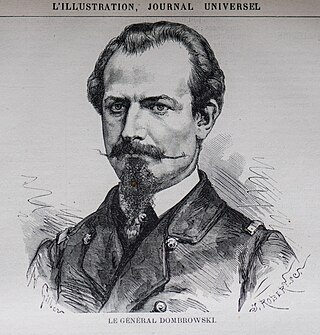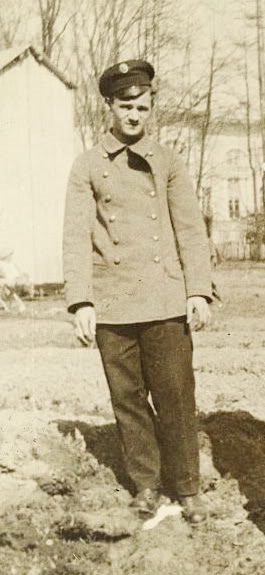Related Research Articles

Alexander III was Emperor of Russia, King of Congress Poland and Grand Duke of Finland from 13 March 1881 until his death in 1894. He was highly reactionary in domestic affairs and reversed some of the liberal reforms of his father, Alexander II. This policy is known in Russia as "counter-reforms". Under the influence of Konstantin Pobedonostsev (1827–1907), he opposed any socio-economic moves that limited his autocratic rule.

Stout is a dark, top-fermented beer style which includes dry stout, oatmeal stout, milk stout and imperial stout.

Boris III, originally Boris Klemens Robert Maria Pius Ludwig Stanislaus Xaver, was the Tsar of the Kingdom of Bulgaria from 1918 until his death in 1943.

Novosibirsk is the largest city and administrative centre of Novosibirsk Oblast and the Siberian Federal District in Russia. As of the 2021 Census, it had a population of 1,633,595, making it the most populous city in Siberia and the third-most populous city in Russia after Moscow and Saint Petersburg. The city is located in southwestern Siberia, on the banks of the Ob River.

Tomsk is a city and the administrative center of Tomsk Oblast in Russia, located on the Tom River. Population: 556,478 (2021 Census); 524,669 (2010 Census); 487,838 (2002 Census); 501,963 (1989 Census).

The Russian Far East is a region in Northeast Asia. It is the easternmost part of Russia and the Asian continent; and is administered as a part of the Far Eastern Federal District, which is located between Lake Baikal in eastern Siberia and the Pacific Ocean. The area's largest city is Khabarovsk, followed by Vladivostok. The region shares land borders with the countries of Mongolia, China, and North Korea to its south, as well as maritime boundaries with Japan to its southeast, and with the United States along the Bering Strait to its northeast.

Pyotr Arkadyevich Stolypin was a Russian statesman who served as the third prime minister and the interior minister of the Russian Empire from 1906 until his assassination in 1911. Known as the greatest reformer of Russian society and economy, his reforms caused unprecedented growth of the Russian state, which was halted by his assassination.

The city of Moscow gradually grew around the Moscow Kremlin, beginning in the 14th century. It was the capital of the Grand Duchy of Moscow and then the Tsardom of Russia until the capital was moved to Saint Petersburg by Peter the Great. Moscow was the capital of the Russian Soviet Federative Socialist Republic from 1918, which then became the Soviet Union, and since 1991 has served as capital of the Russian Federation.

Pavel Nikolayevich Milyukov was a Russian historian and liberal politician. Milyukov was the founder, leader, and the most prominent member of the Constitutional Democratic party. He changed his view on the monarchy between 1905 and 1917. In the Russian Provisional Government, he served as Foreign Minister, working to prevent Russia's exit from the First World War.

Konstantin Petrovich Pobedonostsev was a Russian jurist and statesman who served as an adviser to three Russian emperors. During the reign of Alexander III of Russia, Pobedonostsev was considered the chief spokesman for reactionary positions and the éminence grise of imperial politics. Between 1880 and 1905, he served as Ober-Procurator of the Most Holy Synod, making him the non-clerical Russian official who supervised the Russian Orthodox Church.

Jarosław Żądło-Dąbrowski, also known as Jaroslav Dombrowski, was a Polish nobleman and military officer in the Imperial Russian Army, a Polish nationalist and radical republican for Poland, and general and military commander of the Paris Commune in its later period. He was a participant in the Polish 1863 January Uprising and one of the leaders of the "Red" faction among the insurrectionists as a member of the Central National Committee and the Polish Provisional National Government.

Yuri Lvovich Slezkine is a Russian-born American historian and translator. He was a professor of Russian history, Sovietologist, and served as Director of the Institute of Slavic, East European, and Eurasian Studies at the University of California, Berkeley in 2004-2013. He is best known as the author of the books The Jewish Century (2004) and The House of Government: A Saga of The Russian Revolution (2017).

The Russian conquest of Siberia took place during 1580–1778, when the Khanate of Sibir became a loose political structure of vassalages that were being undermined by the activities of Russian explorers. Although outnumbered, the Russians pressured the various family-based tribes into changing their loyalties and establishing distant forts from which they conducted raids. It is traditionally considered that Yermak Timofeyevich's campaign against the Siberian Khanate began in 1580. The annexation of Siberia and the Far East to Russia was resisted by local residents and took place against the backdrop of fierce battles between the Indigenous peoples of Siberia and the Russian Cossacks, who often committed atrocities against Indigenous Siberians.

Ice is a Polish novel written in 2007 by the Polish science fiction writer Jacek Dukaj, published in Poland by Wydawnictwo Literackie. The novel mixes alternate history with science fiction elements, in particular, with alternative physics and logic. It won the Janusz A. Zajdel Award, European Union Prize for Literature and Kościelski Award.

Craig Edward Mabbitt is an American singer and the lead vocalist for the rock band Escape the Fate. He was formerly the lead vocalist for the bands Blessthefall and The Word Alive. He is also the current lead vocalist of his side-project band The Dead Rabbitts.

Nicholas II or Nikolai II was the last reigning Emperor of Russia, King of Congress Poland and Grand Duke of Finland from 1 November 1894 until his abdication on 15 March 1917. During his reign, Nicholas gave support to the economic and political reforms promoted by his prime ministers, Sergei Witte and Pyotr Stolypin. He advocated modernisation based on foreign loans and close ties with France, but resisted giving the new parliament major roles. Ultimately, progress was undermined by Nicholas's commitment to autocratic rule, strong aristocratic opposition and defeats sustained by the Russian military in the Russo-Japanese War and World War I. By March 1917, public support for Nicholas had collapsed and he was forced to abdicate, thereby ending the Romanov dynasty's 304-year rule of Russia (1613–1917).

Leonid Ivanovich Sednev was a chef's assistant who, together with his uncle Ivan Dmitriyevich Sednev, served former Emperor Nicholas II of Russia and his family during their exile in Siberian villages of Tobolsk and Yekaterinburg from 1917 to 1918. Six hours before the Imperial family and their four retainers were murdered in the cellar of the Ipatiev House on the night of July 16/17, 1918, Sednev was taken to a neighboring house, where he was held until July 20. Officials from the Ural Regional Soviet then shipped him off to live with relatives in Kaluga.

The Russian Imperial Romanov family were shot and bayoneted to death by Bolshevik revolutionaries under Yakov Yurovsky on the orders of the Ural Regional Soviet in Yekaterinburg on the night of 16–17 July 1918. Also murdered that night were members of the imperial entourage who had accompanied them: court physician Eugene Botkin; lady-in-waiting Anna Demidova; footman Alexei Trupp; and head cook Ivan Kharitonov. The bodies were taken to the Koptyaki forest, where they were stripped, mutilated with grenades to prevent identification, and buried.

Alexander II was Emperor of Russia, King of Congress Poland and Grand Duke of Finland from 2 March 1855 until his assassination in 1881. Alexander's most significant reform as emperor was the emancipation of Russia's serfs in 1861, for which he is known as Alexander the Liberator.
Prison of peoples or prison of nations is a phrase first used by Vladimir Lenin in 1914. He applied it to Russia, describing the national policy of that time. The idea of calling Russia a prison is based on Marquis de Custine's book La Russie en 1839.
References
- ↑ "Dr Daniel Beer - Research - Royal Holloway, University of London". Pure.royalholloway.ac.uk. Retrieved 30 October 2017.
- ↑ Rayfield, Donald (29 September 2016). "The House of the Dead by Daniel Beer review – was Siberia hell on earth?". Theguardian.com. Retrieved 30 October 2017.
- ↑ "INTERVIEW: Daniel Beer, author of The House of the Dead: Siberian Exile Under the Tsars - Russian Art + Culture". Russianartandculture.com. 29 July 2016. Retrieved 30 October 2017.
- ↑ "Daniel Beer". Penguin.co.uk. Archived from the original on 7 November 2017. Retrieved 30 October 2017.
- ↑ Beer, Daniel (12 June 2008). Renovating Russia: The Human Sciences and the Fate of Liberal Modernity, 1880–1930 . Cornell University Press. ISBN 9780801446276 . Retrieved 30 October 2017.
- ↑ Nethercott, Frances (1 September 2012). "Renovating Russia: The Human Sciences and the Fate of Liberal Modernity,1880–1930. By Daniel Beer". Cultural and Social History. 9 (3): 469–470. doi:10.2752/147800412X13347542916783. S2CID 145750705.
- ↑ Mogilner, Marina (31 July 2010). "Renovating Russia: The Human Sciences and the Fate of Liberal Modernity, 1880-1930 (review)". Kritika: Explorations in Russian and Eurasian History. 11 (3): 661–672. doi:10.1353/kri.0.0179. S2CID 144609484.